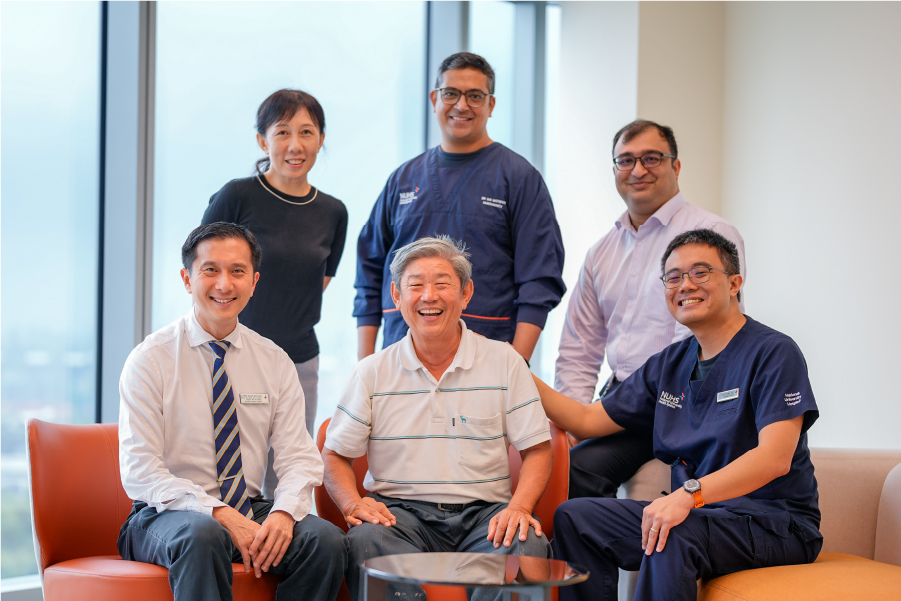From Pathfinder to CalSense to MiSSi, a suite of AI-driven tools gives NUH a shot in the arm, enhancing the hospital's patient care and
operational efficiency.
Issue 3 | December 2023

 Subscribe and ensure you don't miss the next issue!
Subscribe and ensure you don't miss the next issue!
Whether it is answering patient queries, providing support during surgeries or facilitating the discovery of new drugs, artificial intelligence (AI) has nestled its way into the heart of the healthcare sector, accelerating the advancement of a broad spectrum of medical services that would otherwise be hindered by time constraints.
At National University Hospital (NUH), the integration of AI-driven tools and platforms is streamlining operations and elevating the standard of care, empowering healthcare providers to serve patients with improved efficiency and effectiveness.
Clear-AIed emergency navigation
The AI-enabled Pathfinder project provides real-time insights into waiting times and bed occupancy rates, enabling staff in the Emergency Department to anticipate and manage patient flow more effectively. By tracking current departmental statistics and forecasting patient turnout up to a week in advance, Pathfinder aids in mitigating the unpredictability that often overwhelms emergency care facilities.
"This project empowers us to make more informed, data-driven decisions about how best to optimise resource allocation," says Dr Ian Mathews, Deputy Group Chief Technology Officer, National University Health System (NUHS), and Senior Consultant with Emergency Medicine Department, NUH. "This is important as it reduces bottlenecks and improves the efficiency of care delivery by allowing us to adjust manpower and streamline patient admissions based on anticipated demand."
Getting a better sense of calcium levels
Another AI-based platform is CalSense, short for calcium sensing, used to consolidate, process, and visualise the results of patients' blood tests. Developed by NUHS, CalSense is a specialised tool to flag hypercalcaemia, a condition characterised by elevated calcium levels in the blood. Quick identification of this condition is critical, as it can lead to severe complications such as osteoporosis and fractures, kidney stones and potentially sudden cardiac death.
By automating the detection of hypercalcaemia, CalSense cuts the time traditionally required for diagnosis and response, facilitating faster treatment and averting the risks associated with delayed care. The platform's real-time alerts mean that healthcare professionals can act swiftly, accelerating the diagnostic and treatment cycle and reducing the administrative burden on doctors.
"CalSense has significantly improved the speed and accuracy with which we address hypercalcaemia, enhancing the management of the disease across our network of hospitals, national speciality centres and polyclinics," says Associate Professor Ngiam Kee Yuan, Group Chief Technology Officer at NUHS, and Head & Senior Consultant, Division of General Surgery (Endocrine & Thyroid Surgery), Department of Surgery, NUH. "The success of CalSense in detecting hypercalcaemia has prompted the development team to consider using the same technology to detect other diseases."
Robot nurses companions ready to roll
Scheduled for rollout in mid-2024, MiSSi is NUH's first multifunction assistive robotics in patient care. The robot's development was driven by the growing demand for healthcare services and the need to reduce the strain on healthcare professionals. Collaboratively designed by nurses, pharmacists, researchers and engineers, MiSSi combines AI large language models, cloud robotics and novel contactless sensor technology to handle non-nursing tasks such as medication portering, as well as other routine tasks such as recording vital signs and monitoring patients who are at high risk for falls.
MiSSi aims to boost healthcare efficiency while maintaining the human element in patient care. It operates on a 5G network and is integrated with NUHS's Endeavour AI platform, which provides live medical data of
patients to the robot.
"By relieving us of repetitive tasks, MiSSi allows us to dedicate more time to direct patient care, enhancing our focus on personalised treatment and patient engagement," says Sophia Saw, Assistant Nurse Clinician at NUH, who is involved in developing the project.
Like this article? Simply subscribe to make sure you don't miss the next issue of EnvisioningHealth!




















